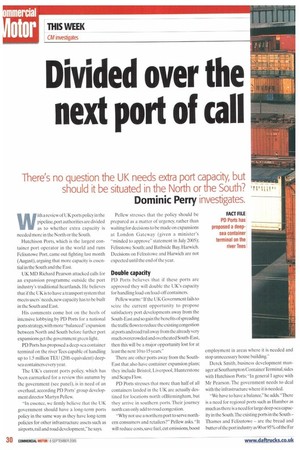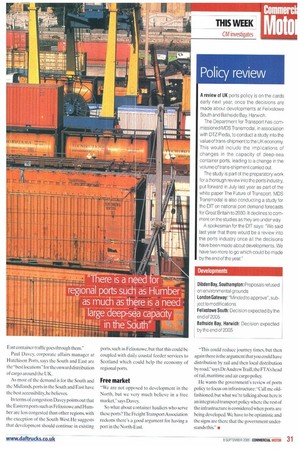Divided over the next port of call
Page 30

Page 31

If you've noticed an error in this article please click here to report it so we can fix it.
There's no question the UK needs extra port capacity, but
should it be situated in the North or the South?
Dominic Perry investigates.
With a review of UK ports policy in the pipeline, port authorities are divided as to whether extra capacity is needed more in the North or the South.
Hutchison Ports, which is the largest container port operator in the world and runs Felixstowe Port. came out fighting last month (August), arguing that more capacity is essential in the South and the East.
UK MD Richard Pearson attacked calls for an expansion programme outside the port industry's traditional heartlands. He believes that if the UK is to have a transport system that meets users' needs, new capacity has to be built in the South and East.
His comments come hot on the heels of intensive lobbying by PD Ports for a national ports strategy, wi th more"balanced" expansion between North and South before further port expansions get the government green light.
PD Ports has proposed a deep-sea container terminal on the river Tees capable of handling up to 1.5 million TEU (20ft-equivalent) deepsea containers every year.
The UK's current ports policy, which has been earmarked for a review this autumn by the government (see panel), is in need of an overhaul, according PD Ports' group development director Martyn Pellew.
"In essence, we firmly believe that the UK government should have a long-term ports policy in the same way as they have long-term policies for other infrastructure assets such as airports, rail and road development," he says. Pellew stresses that the policy should be prepared as a matter of urgency, rather than waiting for decisions to be made on expansions at London Gateway (given a minister's "minded to approve" statement in July 2005); Felixstowe South: and Bathside Bay, Harwich. Decisions on Felixstowe and Harwich are not expected until the end of the year.
Double capacity PD Ports believes that if these ports are approved they will double the UK's capacity for handling load-on/load-off containers.
Pellew warns:1f the UK Government fails to seize the current opportunity to propose satisfactory port developments away from the South-East and so gain the benefits of spreading the traffic flows to reduce the existing congestion at ports and road/rail away from the already very much overcrowded and overheated South-East, then this will be a major opportunity lost for at least the next 10 to 15 years."
There are other ports away from the SouthEast that also have container expansion plans; they include Bristol, Liverpool, Hunterstone and Scapa Flow.
PD Ports stresses that more than half of all containers landed in the UK are actually destined for locations north ofBirmingham, but they arrive in southern ports. Their journey north can only add to road congestion.
"Why not use a northern port to serve northern consumers and retailers?" Pellew asks. "It will reduce costs,save fuel,cut emissions, boost employment in areas where it is needed and stop unnecessary house building."
Derek Smith. business development manager at Southampton Container Termi n al, sides with Hutchison Ports: "In general I agree with Mr Pearson. The government needs to deal with the infrastructure where it is needed.
"We have to have a balance," he adds."There is a need for regional ports such as Humber as much as there is a need for large deep-sea capacity in the South.11ie existing ports in the South — Thames and Felixstowe — are the bread and butter of the port industry as 90 or 95 % of the Far East container traffic goes through them."
Paul Davey, corporate affairs manager at Hutchison Ports, says the South and East are the "best locations" for the onward distribution of cargo around the UK.
As most of the demand is for the South and the Midlands, ports in the South and East have the best accessibility, he believes.
In terms of congestion Davey points out that the Eastern ports such as Felixstowe and Humber are less congested than other regions, with the exception of the South-West.He suggests that development should continue in existing ports, such as Felixstowe, but that this could be coupled with daily coastal feeder services to Scotland which could help the economy of regional ports.
Free market "We are not opposed to development in the North, but we very much believe in a free market," says Davey.
So what about container hauliers who serve these ports?'The Freight Transport Association reckons there's a good argument for having a port in the North-East. "This could reduce journey times, but then again there is the argument that you could have distribution by rail and then local distribution by road," says Dr Andrew Traill, the ETA's head of rail, maritime and air cargo policy.
He wants the government's review of ports policy to focus on infrastructure; "Call me oldfashioned, but what we're talking about here is an integrated transport policy where the rest of the infrastructure is considered when ports are being developed. We have lobe optimistic and the signs are there that the government understands this." •








































































































































































































